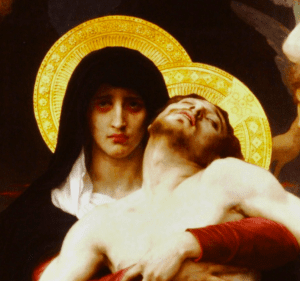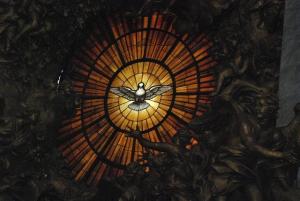
A week or two ago, I was leafing through an old journal I used to keep and came across the following. I didn’t date it, but I think it must have been in 2013 or thereabouts, after my ex and I broke up.
Now we are without one another, and each crucified upon the absence of the other; our very lonelinesses coinhere.
Our hearts were ripped, each from the other; and the wound is inconsolable: blood flows more freely than tears ever did.
Every penstroke is a thorn in the flesh.
All for beauty. It is unbearable, an outrage and a horror; the beauty is no answer, and is the only and wholly adequate vindication of the suffering.
I behold the face of God in the negative shape of this anguish, as in a glass darkly.
Lamentation is consolation. After articulation comes a refractory period where the heart sleeps.
“When I am from him I am dead till I be with him.”1
Of course, the wound was not inconsolable in the end. I’ve recovered, and, while he and I don’t talk much, I have gotten less prone to projecting my feelings onto him. Hardly surprising: a bout of severe depression in one’s mid-twenties is not, as a rule, the pinnacle of one’s moderation and detachment.
All the same, I think there’s something in this—the turn from theodicy towards beauty. I’ve written often enough before of my suspicion of theodicy, rooted in my reading of the book of Job. I have, at times, tried reframing the problem of evil as a question of artistic creation. Beauty is “no answer,” i.e., it’s not a solution to the philosophic problem of evil in the terms in which it is set. But any artist will tell you that the limitations of the material, and even its flaws, are part of the work—things pregnant with magnificence, in the hands of a master. Michelangelo’s David is famous for being made out of a slab of marble previous sculptors had rejected; the Scriptural parallel rises almost unbidden to our lips.

Dorothy Sayers (one of my favorite authors) addresses the issue in Gaudy Night, a novel about her long-running detective, Peter Wimsey, and a mystery writer, Harriet Vane. Harriet is having difficulty with her latest, and specifically with the character of a certain Wilfrid.
“Couldn’t you make Wilfrid one of those morbidly conscientious people, who have been brought up to think that anything pleasant must be wrong … He’d still be a goop, and a pathological goop, but he would be a bit more consistent.”
“Yes—he’d be interesting. But if I give Wilfrid all those violent and lifelike feelings, he’ll throw the whole book out of balance.”
“You would have to abandon the jig-saw kind of story and write a book about human beings for a change.”
“I’m afraid to try that, Peter. It might go too near the bone.”
“It might be the wisest thing you could do.”
“Write it out and get rid of it?”
“Yes.”
“I’ll think about that. It would hurt like hell!”
“What would that matter, if it made a good book?”
The idea that art, beauty, is worth the incredible amount of suffering we see in the world may seem offensive. It may seem irrelevant as well, since most people aren’t artists. Or rather, most people don’t think of themselves as artists; which isn’t the same thing. Dipping out for one more extended quotation, this time from Thomas Merton in Contemplative Prayer:
What am I? I am myself a word spoken by God. Can God speak a word that does not have any meaning?
Yet am I sure that the meaning of my life is the meaning God intends for it? Does God impose a meaning on my life from the outside, through event, custom, routine, law, system, impact from others in society? Or am I called to create from within, with him, with his grace, a meaning which reflects his truth and makes me his “word” spoken freely in my personal context? My true identity lies hidden in God’s call to my freedom and my response to him.

To be clear, Merton was not such a fool as to think that customs and rules were in themselves opposed to interior creation: a large chunk of Contemplative Prayer (and one immediately preceding this passage) is precisely about how liturgical prayer is not in any way opposed to personal prayer. Most people who have an issue with rules as such don’t become Trappists! But they will not do the work of self-creation for us, even if they help. And they are not the point of the Christian life; “the sabbath was made for man, not man for the sabbath.” The great temptation of habitually pious people (like me) is to think that following the rules is enough, which is a little like thinking that keeping your flesh on your bones is enough to be healthy.
I don’t have a definite idea of what this “theodicy of beauty” would look like, at least not yet. But it intrigues me. It certainly seems to fit into the crucifixion better than the alternatives I know of. And if (as I’ve written many times before) we are made in the image of God, and the main thing we know about God in Genesis 1 is that he makes things—then creation is everyone’s concern, not just that of “professional” artists.
1From Religio Medici 2.VI, by Sir Thomas Browne: “There are wonders in true affection: it is a body of Enigma’s, mysteries, and riddles; wherein two so become one, as they both become two. I love my friend before my self, and yet methinks I do not love him enough: some few months hence my multiplied affection will make me believe I have not loved him at all. When I am from him, I am dead till I be with him; when I am with him, I am not satisfied, but would still be nearer him. United souls are not satisfied with imbraces, but desire to be truly each other; which being impossible, their desires are infinite, and must proceed without a possibility of satisfaction.”
I got interested in the book after reading C. S. Lewis’ reference to its minor role in his conversion in Surprised by Joy. Religio is a an odd, charming, very rambling book, a little reminiscent of Donne it its style, though it lacks his clear and consistent purpose.
"creation" - Google News
November 30, 2021 at 04:57AM
https://ift.tt/3D5jg5N
Creation | Gabriel Blanchard - Patheos
"creation" - Google News
https://ift.tt/39MUE4f
https://ift.tt/3bZVhYX
Bagikan Berita Ini














0 Response to "Creation | Gabriel Blanchard - Patheos"
Post a Comment